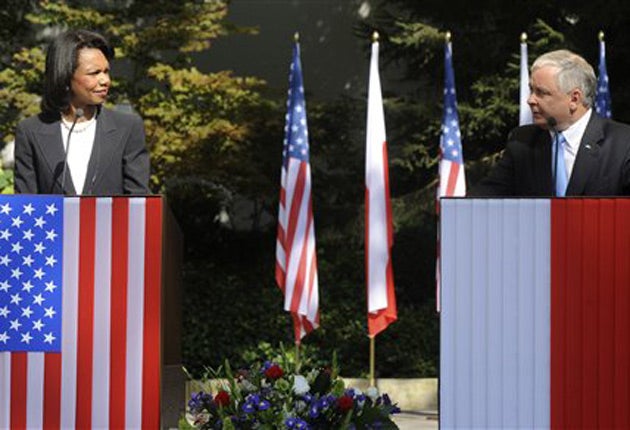The stakes are raised in a new Cold War

The United States and Poland have raised the stakes in the new Cold War with the signing of a deal for a US missile defence base to be situated in a country bordering Russia.
The US secretary of state, Condoleezza Rice and the Polish foreign minister, Radek Sikorski, have signed the pact at a short ceremony in Warsaw to applause from a specially invited audience.
The 10 US interceptor missiles will be deployed 115 miles from Russia’s western border. But just as significant is the US decision to agree to Polish demands for a battery of Patriot missiles as a reward for hosting the missile system. The Patriots are meant to protect Poland from short-range missiles from neighbours — such as Russia.
When the deal was announced last week, Russia warned that Poland would be vulnerable to a possible nuclear strike from Moscow for stationing missiles so close to its neighbour.
The news that the Poles and Americans had reached agreement, after 18 months of negotiations, raised suspicions in Moscow as it came just after the six-day war in Georgia. Russia has fiercely opposed the US plans to locate part of its strategic missile defence shield in Poland and the Czech Republic in the belief that its real target is Russian territory.
The US has always insisted that the potential target would be incoming missiles from Iran or North Korea. The Russian president, Dmitry Medvedev, said that the timing of the agreement showed that the missiles would threaten Russia.
However Ms Rice said before the signing ceremony that: "This is a system that is defensive and is not aimed at anyone," she said. "This is an agreement that will establish a missile defense site ... that will help us to deal with the new threats of the 21st century of a long-range missile threats from countries like Iran or from North Korea."
Unlike the Cold War-style rhetoric between Moscow and Washington over the last few days, this is a real step that could have real consequences by triggering a new missile crisis with Russia. It is not clear yet whether Russia will take concrete measures in retaliation but the reaction is bound to be furious.
The majority of Poles had resisted the idea of hosting the site. But since the Georgia war, public opinion now sees the missile defence as offering a form of protection beyond the North Atlantic Treaty Organisation, to which Poland now belongs. The former Soviet bloc state is also a member of the European Union.
Nato has frozen relations with Russia to protest against the failure of Russian troops to withdraw from Georgia in defiance of a peace agreement calling for an immediate pullout. Nato foreign ministers at a crisis meeting yesterday reiterated their support for Georgia and
Ukraine to eventually join the 26-member alliance. But they did not agree to sanctions against Moscow over its use "excessive force" in crushing Georgia's attempt to recover the breakaway territory of South Ossetia
Join our commenting forum
Join thought-provoking conversations, follow other Independent readers and see their replies
Comments
Bookmark popover
Removed from bookmarks